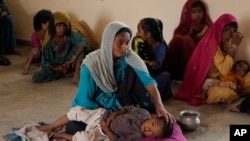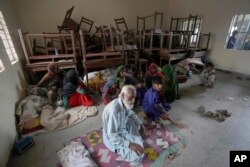The coastal regions of India and Pakistan were on high alert Wednesday with tens of thousands of people being evacuated a day ahead of a cyclone's expected landfall.
The India Meteorological Department said Cyclone Biparjoy was packing sustained winds of up to 145 kilometers per hour (90 mph) and was projected to make landfall near Jakhau port in the Kutch district of India's Gujarat state on Thursday.
Residents living within 5 kilometers (3 miles) of the coast in Gujarat were evacuated, and those living within 10 kilometers (6 miles) may also have to leave, officials have said.
Five people have been killed so far in incidents related to the cyclone, including three boys who drowned off Mumbai's coast and a woman who was killed in an accident caused by strong winds in Gujarat. Rescuers were searching for another person who drowned off Mumbai.
Experts say climate change is leading to an increase in cyclones in the Arabian Sea region, making preparations for natural disasters all the more urgent.
At a relief camp for displaced people in the Pakistani village of Gharo in Sindh province, laborer Allah Noor, 59, said soldiers came and evacuated them during strong winds.
In Kutch, where the cyclone was expected to hit land, 57-year-old boat owner and businessman Adam Karim Dhobi said this was the worst storm he'd seen since 1998.
"We have parked our boats in safe places," Dhobi said. "We are praying to God that this cyclone doesn't cause too much damage here."
The Press Trust of India news agency said nearly 50,000 people have been evacuated to relief camps in Gujarat. Nikhil Mudholkar from the National Disaster Response Force, who was overseeing relief operations in Devbhoomi Dwarka district along Gujarat's coast, said they were fully prepared and were now in waiting mode.
"We have deployed 23 teams and have moved everyone living near the coast to safer ground," Mudholkar said. "Windspeeds have picked up now and rains have started too."
In Pakistan, despite strong winds and rain, authorities said all people from vulnerable areas have been moved to safer places in the southern districts, including Thatta, Keti Bandar, Sajawal and Badin — regions that only last summer were hit by devastating floods that displaced thousands.
For many there, it was a second displacement in less than a year. People packed as many of their belongings as they could into their cars and left — either on their own or under troop escort — heading to relief camps set up inside government buildings and schools.
At the Gharo relief camp, 80-year-old Bayan Bibi said there was no medicine for the sick available at the camp.
On Tuesday, Pakistani Prime Minister Shahbaz Sharif ordered the evacuations from areas at risk and asked local authorities to arrange food, shelter and medical facilities for the displaced. Pakistan Climate Minister Sherry Rehman urged people not to panic but work with the authorities, promising they would be taken to safer places.
She said the threat of the cyclone making landfall in Karachi, Pakistan's largest city with 20 million people, had been averted. She told reporters that Pakistan will consider suspending commercial flights when it assesses the situation on Thursday.
Nearly 80,000 people have been evacuated or have voluntarily moved away from danger zones, authorities said.
Pakistan's electricity minister, Khurram Dastgir, warned at a news conference of power outages once the cyclone makes landfall. He said transmission lines will likely be damaged and that the government has deployed 2,000 engineers to deal with the situation in the south.
The cyclone has "extensive damaging potential" and is likely to impact the Kutch, Devbhumi Dwarka and Jamnagar districts the most, India's meteorological department says.
Fishing activities have been suspended in both countries until Friday and all ports in the region have been shut. Dozens of trains and flights were diverted or canceled.
On Tuesday, Indian Home Minister Amit Shah announced a budget of $972 million for disaster management.
A recent study shows that the Arabian Sea has warmed up by almost 1.2 degrees Celsius (2.2 degrees Fahrenheit) since March this year, making conditions favorable for severe cyclones, he said.
"The oceans have become warmer already on account of climate change," said Raghu Murtugudde, an Earth system scientist at the University of Maryland.
Another study, in 2021, found that the frequency, duration and intensity of cyclones in the Arabian Sea increased significantly between 1982 and 2019, he said.
Cyclone Tauktae in 2021 was the last severe cyclone that made landfall in the region. It claimed 174 lives, a relatively low figure, thanks to extensive preparations ahead of the storm.
In 1998, a cyclone that hit Gujarat state claimed more than 1,000 lives and caused extensive damage. A cyclone that hit Sindh province and Karachi in 1965 killed more than 10,000 people.





